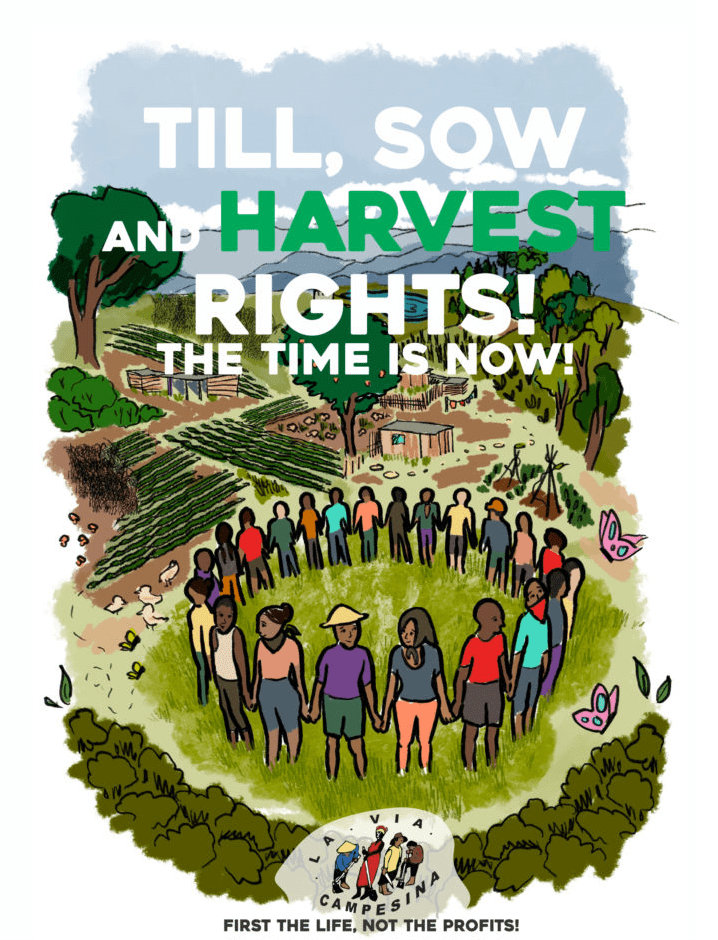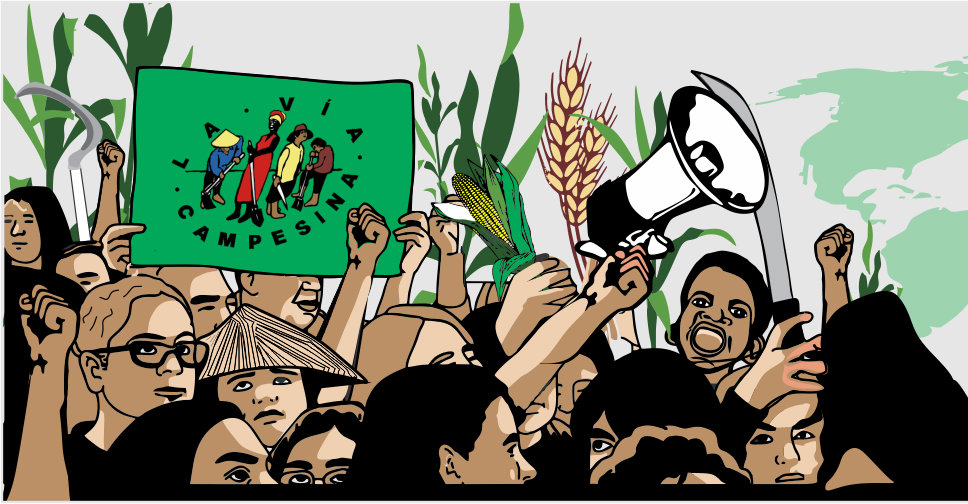This past December, LVC celebrated the second anniversary of the adoption of the UN Declaration on the rights of peasants and other people working in rural areas (UNDROP) at the United Nations General Assembly. As we reflect on the struggles and process that led to adoption, we consider the dynamic work currently being undertaken by member organizations and allies to implement the UNDROP in their respective contexts. We also acknowledge the ongoing efforts to keep the UNDROP on the forefront of UN agendas, both at the Human Rights Council and the Food and Agriculture Organization of the United Nations (FAO). In many respects, the adoption process was the comparably ‘easier’ part than the implementation before us: we are now tasked with taking the articles from the pages of the declaration and into our communities, countries, and territories, transforming it from demands to realities. Of course, there is no unified global implementation strategy: our unique political, economic, social, and cultural contexts shape our rights demands and inform our calls to action. The UNDROP is a living document: it will move with us despite shifting tides.
On the ground, in our communities and organizations, we are inextricably tied to the shared struggles that bring us together as a movement of peasants. This is why the UNDROP is such an important tool for the movement: it uses common threads to weave a narrative together that demands peasant rights be respected and upheld no matter the circumstance.

To honour this second anniversary, nearly two hundred LVC members gathered online to share reflections and analyses regarding UNDROP implementation strategies, actions, and popular education. Exchanges like this – especially in the time of COVID-19 – are vital in maintaining the bonds that connect us as peasants. We heard from representatives of every LVC region – Southeast and East Asia, South Asia, Arab region and North Africa, Europe, North America, Central America, West-Central Africa, Caribbean, South America, and Southern and Eastern Africa – who outlined pressing rights violations, communication and outreach strategies, and COVID-19 responses.
The following are short highlights from each intervention:
From Southeast and East Asia, we heard about efforts to gather data across Indonesia to better understand peasant struggles and the importance of political education and formation, and advocacy based on real cases (such as the criminalization of an SPI (Indonesian Peasant Union) member for defending his land). The members in the region focused on the implementation of articles regarding State obligation, access to justice, right to land, right to seeds, right to biodiversity, and cultural rights and traditional knowledge. Training, and advocacy based on cases are happening in the ground to increase ownership of UNDROP. Translation of the UN Declaration to national/local languages are also important aspect of the implementation.
From South Asia, we heard about how peasants are struggling to sell their products while simultaneously facing malnutrition and hunger. We were inspired to hear about the ‘Peasant Rights Act’ in Nepal, currently in the final stages of ratification at the national level, which will be the first of its kind in the country.
We heard from comrades in Palestine of Arab and North Africa region, who are carrying out campaigns around three UNDROP articles in particular: right to land, access to markets, and right to seeds. Numerous actions such as workshops, conferences, and mobilizations on the ground are taking place to explain the rights demanded in the UNDROP and build a movement to demand the Declaration be ratified at the national level.
The UNDROP also provides a roadmap for change in Europe: The European Coordination Via Campesina (ECVC) is working to make connections between policy and UNDROP on all occasions. For example, the pandemic has made clear how terrible the current food system in Europe. ECVC also connect UNDROP with very crucial issue: the situation of seasonal and migrant agricultural workers. This year, they hope to strengthen the freedom of association and peaceful demonstration including the issue of digitalization and use of technology, and also communication work, lobbying efforts at the EU level, and resuming negotiations in the UN Human Rights Council.
North America is far from immune to peasant rights violations, and the pandemic is widening the cracks of the neoliberal, industrial food system. In particular, labour rights and migrant worker rights have been violated repeatedly as these essential workers have been forced to work in perilous conditions. Efforts must be doubled to create a popular movement in support of the UNDROP in this region; thus far its reach is limited.
The human rights situation in Central America took a step backward in the last year, as natural disasters, corrupt governments, and the absence of democratic, transparent responses to COVID-19 saw an increase in rights violations, violence, and disappearances. Member organizations are working to increase the knowledge and ownership of the UNDROP as a legal tool through trainings, forums, articles in the media, and workshops.
In the Caribbean, the majority of the rights outlined in the UNDROP have been violated across the region, except for in Cuba. Two articles are particularly important to current contexts: the right to land (Article 17) in Haiti and Dominican Republic, as forced evictions and industrial logging are rampant, and the right to association (Article 9), as corporations are moving into markets and pushing their products instead of those produced by peasants.
South America has been experiencing a worsening human rights situation in the COVID-19 context: evictions, criminalization of movement leaders, murders with impunity, and increased violence against women are but a few horrific examples. There have been many solidarity actions using the UNDROP as a tool to fight oppression (an example of note is in Argentina, where the UNDROP has been employed against forced evictions and the use of agrotoxins). The Latin American Coordinating Committee of Rural Organizations of Via Campesina (CLOC) will focus on a communication campaign, lobbying at the national level, and working on direct actions at the local level.
Finally, we heard from members in Southern and Eastern Africa who are pushing for national governments to implement the UNDROP; Uganda is a notable case, as a push for implementation has been renewed with the new government. Member organizations are working hard to communicate the content of the UNDROP, including summarizing the document to make it more accessible. The radio has been an important tool for amplifying the UNDROP. Fortunately, governments in this region have shown interest in adapting the UNDROP in national policies. Land conflicts, water crisis, climate justice, agrotoxins, access to health especially in times of Covid-19, access to agricultural information, seeds are obstacles in the daily struggle of members in the region.
These snapshots into each region are invaluable in the ongoing broad effort to implement the UNDROP. The more opportunities we have to share ideas, actions, and strategies, the stronger the UNDROP becomes as a policy tool for change. It is through this continued connection and dialogue between the UNDROP and our daily struggles that we spread its power as a political tool for change. It is clear that as a movement, we must continue to emphasize political training and the creation of popular materials in order to empower all of our members to understand, relate to, use and advocate for policy implementation of the Declaration across scales.
Moving forward, implementation strategies will continue to evolve and grow in international spaces. We will continue to engage in international spaces, scaling out the UNDROP agenda in Rome Processes (Committee on World Food Security (CFS) and the Civil Society and Indigenous People’s Mechanism(CSM), The International Planning Committee for Food Sovereignty (IPC), and the UN Decade for Family Farming), building relations with UN special procedures (for example the UN Special Rapporteur on the Right to Food), and creating a special procedure for the rights of peasants in the UN human rights system. Maintaining our presence in institutional spaces during the COVID-19 crisis has not been easy, but our commitment to implementation has not lost momentum.

On the ground, in our communities and organizations, we will continue to inspire one another to come together under the umbrella of the UNDROP. It is here that we build the movement and make the rights of peasants our lived realities.

